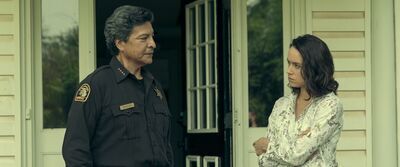
Like “Where the Crawdads Sing,” “The Marsh King’s Daughter” struggles to evoke the lyricism of the language in the novel it is based on, despite exquisite images of the wetland settings. Despite strong work from Ben Mendelsohn, Daisy Ridley, and Gil Birmingham, director Neil Burger's adaptation is a medium-level thriller.
Helena (Brooklynn Prince) lives with her parents in an isolated shack deep within the Edenic marshes of Michigan’s Upper Peninsula. She struggles to understand her mother (Caren Pistorius). “She is always mad at me,” Helena tells her father, Jacob (Mendelsohn). “She can’t see happiness like we do,” he says. This is the first sign of how he makes Helena feel special and more connected to him than to her mother. Jacob warns her she will have twice as many chores as punishment for going hunting with him instead of staying at home, and she tells him it is worth it. Helena adores her father. She loves the way he teaches her about the only world she knows, even when it is brutal—a chewed-off paw left behind by an escaped coyote, a wolf shot by her father, leaving its cub to die, the poke and stick tattoos her father gives her all over her body to commemorate her achievements and failures. He tells her that all that matters is family.
One day, when her father is out, a man rides up on a motorcycle with a cell phone that is out of range. He is lost in the marsh. It is jarring for us to realize this story was taking place close to the present day because the family is so far off the grid their lives would be no different 50 or 75 years ago. It is jarring for Helena, who has no sense of any other part of the world. And it is jarring when her mother runs out to climb on the motorcycle, desperate to escape. Helena refuses to go, and finally, her mother knocks her out so they can get away.
When she comes to, they are in a city with the police. Helena’s mother was kidnapped by her father, and the motorcycle was her first opportunity to get away. Helena, at first, refuses to believe her father could have done anything wrong. But once he is captured and in prison, she begins to understand what he did.
We next see Helena as an adult (Ridley) 20 years later. She is happily married and a devoted mother. In the book, she starts a business with a connection to the world of her childhood. But the film emphasizes her break with the past by putting her as far as possible from the marsh. She works in a large, brightly lit, open-space office, typing numbers into a spreadsheet on a screen. Helena has closed herself off from her past and from anyone who knows of her connection to the headlines about her mother’s kidnapping and her father’s imprisonment. Her husband (Garrett Hedlund) has no idea. She answers questions about her family with vague lies. She refuses to have any contact with her stepfather (Birmingham, bringing a welcome sense of quiet, steadfastness, honor, and a touch of humor).
And then, one day, Helena comes home to find her house filled with police. Jacob has escaped. Can she use her father’s lessons about survival to find him? Can she free herself from his other lessons, the ones that tied them together?
In one of the film’s best scenes, Helena begins to tell her husband the truth about her childhood. But then the rest of the movie is a predictable chase through the marsh. Mendelsohn, one of Hollywood’s top choices for bad guys, shows us how Jacob’s menace lurks beneath his power to entice, and how he can appear to be gentle and ruthless at the same time. He tells his young daughter that if she does not shoot a deer, they will not eat, and pierces her skin for a tattoo while explaining its symbolism. Ridley’s scenes with Helena’s young daughter are tender and touching. But the film’s pacing sags, undercutting the sense of urgency that makes a thriller.
Now playing in theaters.
0 Commentaires